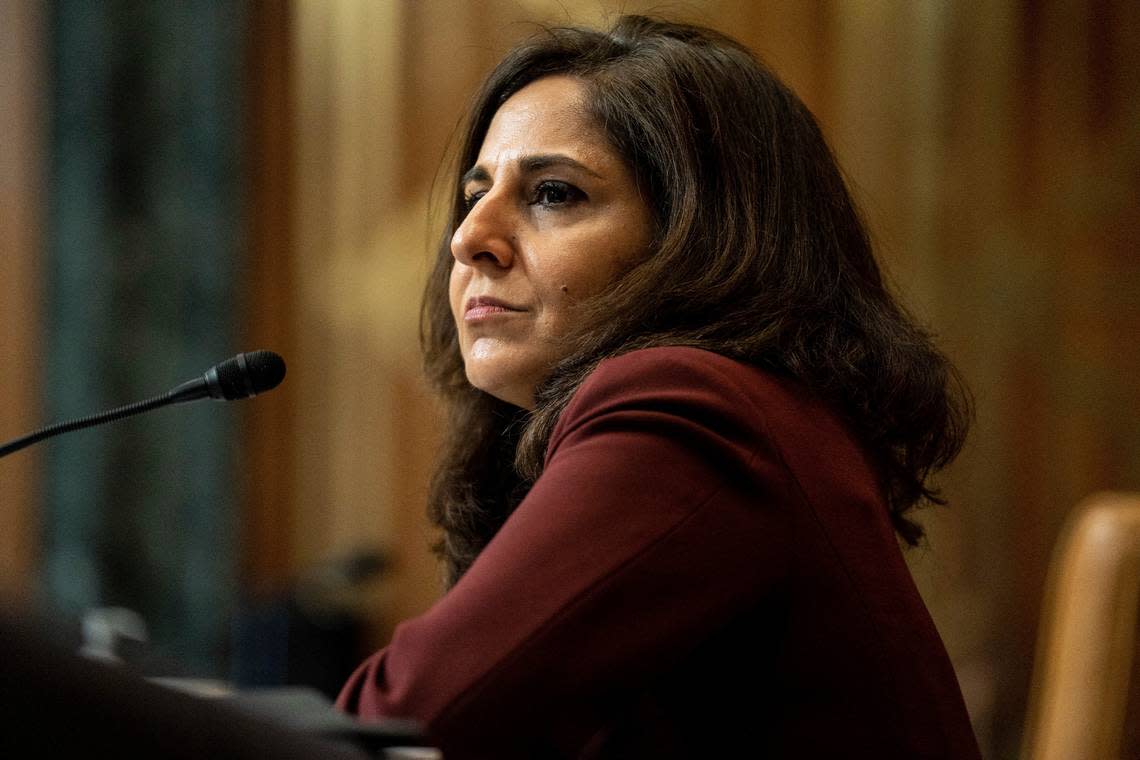White House withdraws Neera Tanden nomination for Cabinet post. How common is that?

- Oops!Something went wrong.Please try again later.
The White House on Tuesday accepted Neera Tanden’s withdrawal of her Cabinet post nomination.
President Joe Biden previously nominated her to serve as director of the Office of Management and Budget. But her nomination was withdrawn after Democratic Sen. Joe Manchin and several Senate Republicans said they would not vote to confirm her to the post — signaling her confirmation would not get enough support in the narrowly divided chamber.
Biden said in a statement Tuesday evening he had accepted her request to “withdraw her name.”
“I have the utmost respect for her record of accomplishment, her experience and her counsel, and I look forward to having her serve in a role in my Administration. She will bring valuable perspective and insight to our work,” the statement said.
Tanden wrote in a letter to Biden that she did not believe there was a “path forward to gain confirmation.”
“I do not want continued consideration of my nomination to be a distraction from your other priorities,” she wrote in the letter, according to the White House.
Tanden is the first of Biden’s Cabinet nominees to not be approved.
How often has this happened?
Since 1789, the Senate has “explicitly rejected” less than 2% of Cabinet nominees.
“The major value of the confirmation process has been to provide an airing of the nominee’s views, to serve as a reference point against which to measure his or her future performance,” The U.S. Senate site says. “Only in the most blatant instances of unsuitability have these lesser nominees been rejected.”
The last time a Cabinet nominee was rejected was during President George H.W. Bush’s administration in 1989.
The Senate rejected John G. Tower’s nomination for secretary of defense. During his confirmation hearings, allegations arose surrounding potential conflicts of interest related to the position and surrounding aspects of Tower’s personal life, Time magazine reports.
Senators eventually voted 53-47 not to confirm him, marking the first rejection in 30 years.
Withdrawals of nominees, however, are more common. Here’s a look at such instances in recent presidencies:
▪ Donald Trump: Three Cabinet nominees — Chad Wolf for secretary of Homeland Security, Ronny Jackson for secretary of Veterans Affairs and Andrew Puzder for secretary of Labor — were withdrawn.
▪ Barack Obama: Three nominees were withdrawn in 2009: Judd Gregg for secretary of Commerce, Tom Daschle for head of the Department of Health and Human Services and Bill Richardson for secretary of Commerce. The nominations for Gregg and Richardson were never officially received by the Senate.
▪ George W. Bush: Linda Chavez’s nomination for secretary of Labor was withdrawn in 2001 and Bernard Kerik’s nomination for secretary of homeland security was withdrawn in 2004.
▪ Bill Clinton: Three nominees were withdrawn: Hershel W. Gober for Veterans Affairs and Anthony Lake for CIA director in 1997 and Zoe Baird for Attorney General in 1993.
Why wasn’t Tanden confirmed?
Tanden has come under scrutiny for past tweets in which she criticized lawmakers from both parties — inciting questions from some senators about whether she would contribute to the unity promised by Biden’s administration, The New York Times reports.
Sen. Susan Collins, a Republican from Maine, said in a statement Monday that she doesn’t believe Tanden has the “experience nor the temperament” to lead the OMB.
“Her past actions have demonstrated exactly the kind of animosity that President Biden has pledged to transcend,” Collins wrote.
A spokesperson for Sen. Mitt Romney, a Republican from Utah, told CNN the senator believes Tanden is divisive.
“Senator Romney has been critical of extreme rhetoric from prior nominees, and this is consistent with that position. He believes it’s hard to return to comity and respect with a nominee who has issued a thousand mean tweets,” the statement said, according to CNN.
During her confirmation hearings this month, Tanden apologized for the tweets, saying she deleted them prior to the election because she “regretted her tone,” according to the Times.
The White House had previously stood by her nomination and defended her record.
“Neera Tanden=accomplished policy expert, would be 1st Asian American woman to lead OMB, has lived experience having benefited from a number of federal programs as a kid, looking ahead to the committee votes this week and continuing to work toward her confirmation,” White House Press Secretary Jen Psaki tweeted on Feb 22.
Additionally, some women’s rights activists and Democrats have decried the scrutiny she’s faced as a “double standard,” Politico reports.
“Her nomination is very significant for us Asian American and Pacific Islanders,” Rep. Judy Chu, a Democrat from California and head of the Congressional Asian Pacific American Caucus, told Politico. “I do believe that this double standard has to do with the fact that she would be a pioneer in that position.”
Shalanda Young, who was previously nominated to serve as deputy OMB director has been floated as a potential replacement for Tanden, sources told CNN, and Axios reports that House Democrats have been “quietly mounting” a campaign for Young to be the new nominee for the post.
It’s possible Tanden will be offered another White House job that won’t require Senate confirmation, sources told CNN.

